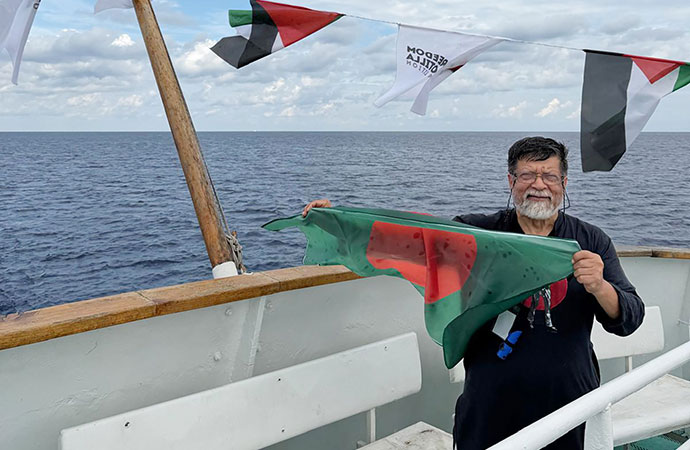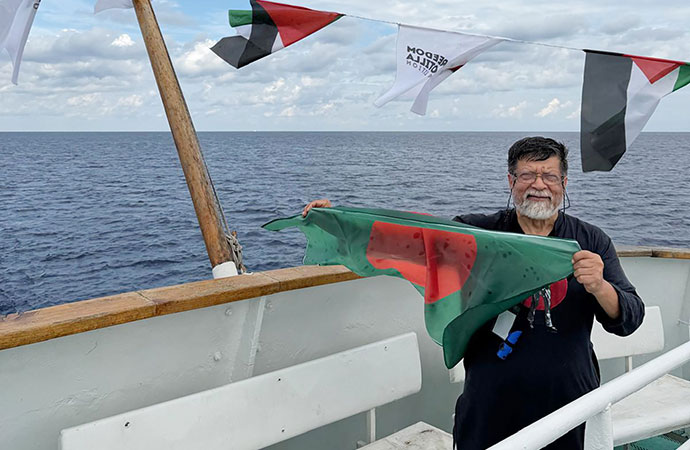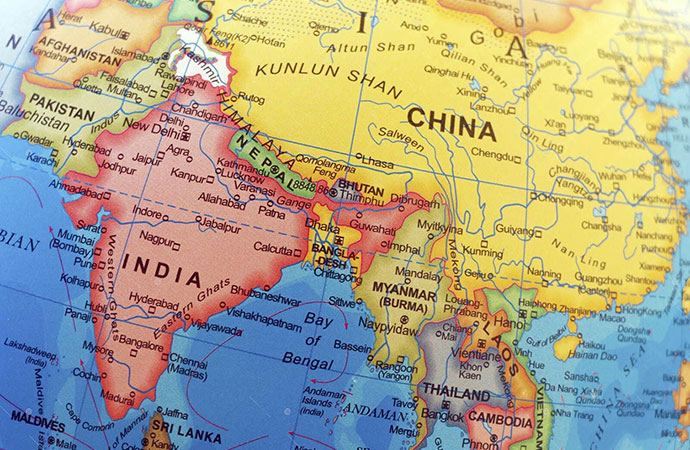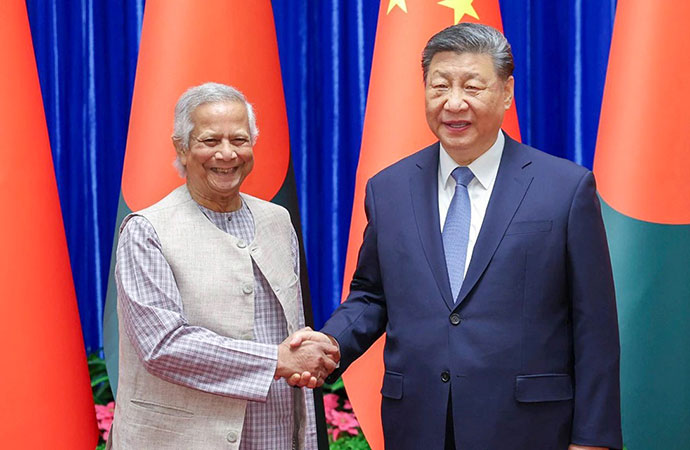Reportage

The team on board Conscience monitor the attack by Israeli forces on the Alma, which was part of the Global Sumud Flotilla ahead of them. (Shahidul Alam)
The Israeli interception of a Gaza-bound flotilla carrying humanitarian aid and hundreds of activists raises questions about what any nation can legally do to enforce a blockade in international waters.
As dozens of boats sailed closer to Gaza on Wednesday afternoon (Oct.1) as part of the Global Sumud Flotilla, the Israeli navy warned them to turn back.
"You are entering an active war zone. If you continue and attempt to break the naval blockade, we will stop your vessel," a member of the Israeli navy told the activists via radio. Then Israeli military personnel stormed the vessels and seized activists, including Greta Thunberg, Nelson Mandela's grandson and several European lawmakers.
The flotilla attracted great attention in Bangladesh due to the presence of celebrated photographer and activist Shahidul Alam on one of the vessels that was part of a second flotilla of ships formed by The Freedom Flotilla Coalition and Thousand Madleens to Gaza, that was still on its way after departing Italy last week.
The Israeli action sparked condemnation from world leaders and human rights groups who say Israel violated international law.
Colombian President Gustavo Petro has expelled all remaining Israeli diplomats from the country in response, and denounced the interception as an "international crime by [Israel's Prime Minister] Netanyahu".
Petro also terminated Colombia's free trade agreement with Israel, in place since 2020, and called for the release of two Colombians who were aboard the flotilla.
Amnesty International's Secretary General, Agnès Callamard, said Israel's blockade on Gaza was "unlawful" and that the "decades-long impunity for Israel's blatant violations of international law must end".
A humanitarian mission
The activists say their nonviolent, civilian mission is lawful. Though they carried only a symbolic amount of aid, including baby formula, food and medical supplies, their goal, they say, is to establish a humanitarian corridor to facilitate the flow of aid into famine-stricken Gaza.
Israeli and European government officials had offered alternatives for the flotilla to transfer its aid to the Palestinian territory, which the activists rejected citing Israel's tight control on all that enters Gaza.
Defending their mission, flotilla activist and spokesperson Thiago Ávila cited a provisional International Court of Justice ruling that ordered Israel to "take immediate and effective measures to enable the provision of urgently needed basic services and humanitarian assistance to address the adverse conditions of life faced by Palestinians in the Gaza Strip."
"You are not allowed by international law to stop us. Therefore we do not comply with your request," he told the navy via radio shortly before the interceptions began some 70 nautical miles (130 kilometers) from the shores of Israel and Gaza.
Only one boat appears to have crossed the 12-nautical-mile line (22-kilometer line) marking territorial waters off Gaza.
Interception in international waters
The UN Convention on the Law of the Sea stipulates that a nation's territory does not extend beyond 12 nautical miles (19 kilometers) from its shores. It says authorities may exercise control up to 24 nautical miles (45 kilometers) from land to prevent violation of customs, immigration, fiscal or sanitary laws.
Robbie Sabel, an international law expert and former legal adviser to the Israeli Foreign Ministry, said states generally don't have the right to seize ships in international waters, though there are exceptions, including during armed conflict.
Even before the latest war, Israel was in an armed conflict with Hamas, Sabel said, allowing it to intercept ships it suspected violated its longstanding blockade of Gaza. Rights groups have long criticized the blockade as the unlawful punishment of Palestinians.
A contentious maritime blockade
Yuval Shany, an expert on international law at Hebrew University in Jerusalem, said as long as Israel's blockade of Gaza is "militarily justified" to keep out weapons and the ship intended to break it, Israel can intercept the vessel after prior warning.
The debate over the legality of Israel's blockade remains a point of contention.
Adalah, a legal rights group in Israel representing the activists, said in a statement that "the abduction of peaceful civilians in international waters, constitutes a brazen violation of international law."
Omer Shatz, an Israeli international law expert who teaches at Sciences Po University in Paris and co-litigated a previous flotilla case before the Supreme Court of Israel, told The Associated Press that even if the disputed siege of Gaza was considered lawful, "international law paves a humanitarian road from the high seas to Gaza," he said.
"If the basic needs of the population are not provided by the occupying power, there is a right to provide humanitarian aid, albeit under certain conditions," Shatz said. Israel has the right to board and search the vessels to verify the cargo, as it does with aid trucks crossing into Gaza by land.
It's not the first time Israel has halted and confiscated humanitarian ships bound for Gaza. Dozens of boats have attempted to reach the Palestinian territory in the past two decades, but none has reached it since 2008.
In 2010, an Israeli commando raid on the Mavi Marmara flotilla descended into violence. Eight Turkish activists and one Turkish-American were killed.
A subsequent UN report acknowledged "attempts to breach a lawfully imposed naval blockade place the vessel and those on board at risk," while also urging member states to be cautious in using force against civilian vessels. It called on humanitarian missions to deliver aid through regular channels and said a country's naval blockade "must abide by their obligations with respect to the provision of humanitarian assistance."
Enforcing international maritime law is a challenge across the globe. Generally, only states can take other states to court for violations of the UN Convention for the Laws of the Sea. But there are other legal frameworks and mechanisms individuals can use to seek justice, including those their state flags are party to. For example, Israel forcibly removing people from foreign-flagged vessels in international waters and taking them to Israel could be considered a crime, Shatz said.
The state prosecutors' office of Spain told The Associated Press on Thursday that it will gather information on the flotilla interception as part of its ongoing effort to collect evidence of possible human rights violations by Israel to be presented in international courts.
Activists meanwhile say they will continue to attempt to break the Israeli blockade by sea.
Shahidul Alam on board 'Conscience'
The vessel carrying Alam, Conscience, set off from the Italian coastal town of Otranto on September 30. Bangladeshis have been following its progress with great interest, and Alam himself announced he is carrying the love and support of the people of Bangladesh for Palestine with him. His following on social media has gone through the roof, more than doubling (from 230,000 to over 500,000) on Facebook in the space of just a few days, as people flocked to his account for his updates on the flotilla's progress.
He has been posting photos of himself carrying the Bangladesh flag, wearing a July Uprising icon Shaheed Abu Sayed t-shirt, and of his fellow activists on the boat engaging in various activities.
As news of the Sumud Flotilla being intercepted by Israeli forces broke, he posted the following:
"This is Shahidul Alam from the upper deck of 'Conscience Flotilla' the largest of this wave of flotillas and the last one to sail. Storm warnings are coming in from the Greek authorities. We went through a storm last night. The captain increased speed so we could stay ahead of the storm. The storm and the lightening (sic) have gone. It has also stopped raining. We are further behind from the rest of the flotilla. The ones in the front have already been attacked. We continue on our path to Gaza, undeterred by this intimidation. We will break the siege. Palestine will be free."
Later on Thursday, he reported sea-sickness, that forced him to vomit and lose his footing. A few hours later though, he reported it was "nothing serious" and even poked some fun at himself for acting like "a drama queen".
As of Friday morning, Conscience was still sailing towards its destination.

























Leave a Comment
Recent Posts
Breakfast at Tiffany’s
Breakfast at Tiffany’s is an Old Hollywood film, released in 196 ...
Kalidas Karmakar’s ‘Holy War’ ...
Works of celebrated Bangladeshi masters, including Shilpacharya Zainul ...
All eyes on the Freedom Flotilla, as Shahidul Alam s ..
The disquiet in the Hills
Ocean Collective Summit 2025 Turning ‘What If’ into ..
Dhaka, Beijing should ‘deepen strategic partnership’ ..